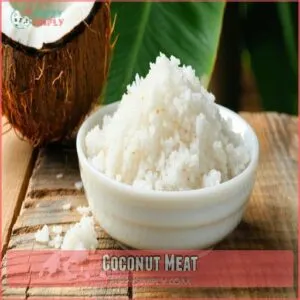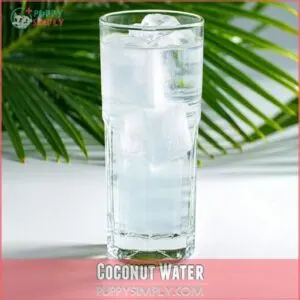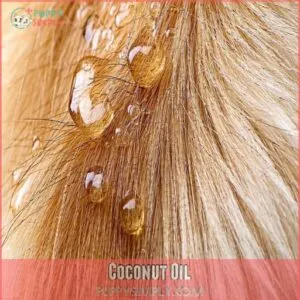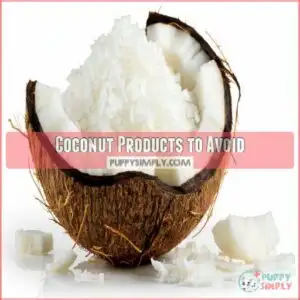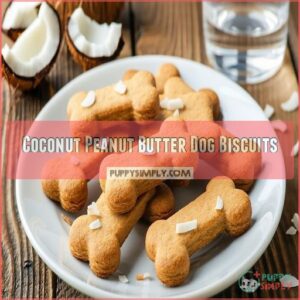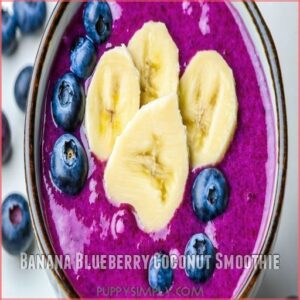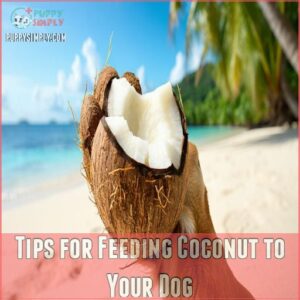This site is supported by our readers. We may earn a commission, at no cost to you, if you purchase through links.
 Yes, your dog can eat coconut safely, but you’ll want to stick to fresh coconut meat and oil in small amounts.
Yes, your dog can eat coconut safely, but you’ll want to stick to fresh coconut meat and oil in small amounts.
Just like that friend who can’t resist a second helping of dessert, too much coconut can upset your pup’s stomach.
The good news? Coconut offers some impressive health perks for your furry friend, including immune system support and healthier skin.
You’ll need to avoid coconut husk and sugary coconut products, though – they’re definitely on the "no-no" list.
From frozen treats to homemade biscuits, there are plenty of creative ways to share this tropical treasure with your four-legged foodie.
Table Of Contents
- Key Takeaways
- Coconut Safety for Dogs
- Can Dogs Eat Coconut
- Coconut Products Safe for Dogs
- Coconut Products to Avoid
- Benefits of Coconut for Canine Health
- Fun and Safe Ways to Feed Coconut
- Tips for Feeding Coconut to Your Dog
- Frequently Asked Questions (FAQs)
- Can dogs eat coconut water?
- Can dogs eat coconut butter?
- Can dogs eat coconut milk?
- Can dogs eat Coconut flour?
- Can dogs eat coconut oil?
- Can puppies eat coconut?
- Is coco okay for dogs?
- How much coconut can I give my dog?
- Is it OK for dogs to eat Coco Puffs?
- Why can’t dogs have Coco?
- How much coconut can my dog eat daily?
- Can coconut help with my dogs bad breath?
- Are certain dog breeds more sensitive to coconut?
- Does coconut affect medication absorption in dogs?
- Can puppies under 6 months have coconut products?
- Conclusion
Key Takeaways
- You can safely give your dog small amounts of fresh coconut meat, water, and oil.
- Avoid coconut husks, coconut milk, and commercial coconut water with added sugars or xylitol. These can cause digestive upset or worse.
- Monitor your dog for any digestive issues after introducing coconut, especially at first.
- Coconut offers several health benefits for dogs, such as immune support and improved skin and coat health, which can be attributed to its beneficial fats, fiber, and antioxidants found in coconut for dogs. Coconut offers several health benefits for dogs, such as immune support and improved skin and coat health, but it shouldn’t be a daily staple.
Coconut Safety for Dogs
You’ll be happy to know that coconut is perfectly safe for your furry friend to enjoy as an occasional treat, though moderation is key to prevent tummy troubles.
While you can feed your dog fresh coconut meat, water, or oil, you’ll want to avoid certain products like sweetened coconut water or the fibrous husk that could cause choking.
Is Coco Okay for Dogs
For your furry friend’s diet, coconut can be a safe and healthy addition in moderation.
Unlike chocolate or cocoa, which are toxic to dogs, coconut isn’t harmful when served properly.
Here’s what you need to know:
- Fresh coconut meat is safe and digestible for most dogs
- Puppies and senior dogs can enjoy coconut in smaller portions
- Dogs with allergies or pancreatitis should avoid coconut
- Monitor your pup for any digestive issues when introducing coconut
Remember to start with tiny amounts to make sure your dog tolerates it well.
Benefits of Coconut for Dogs
Several remarkable benefits make coconut a superfood for your furry friend.
Similar to sunflower seed-based spreads like SunButter for dogs, coconut-based treats can offer various benefits and risks. Let’s explore what this tropical treat can do for your pup’s health and happiness.
| Benefit | How It Helps |
|---|---|
| Immune System | Lauric acid boosts natural defenses |
| Joint Health | Reduces inflammation and stiffness |
| Skin & Coat | Promotes healthy fur and reduces itching |
| Digestion | Supports healthy gut function |
| Energy Levels | Provides clean, natural energy boost |
Just remember: moderation is key!
Think of coconut as a healthy bonus, not a daily staple in your dog’s diet.
Can Dogs Eat Coconut
Many dog owners mix up cocoa (which is toxic) with coconut (which is safe).
You’ll be happy to know that coconut is perfectly fine for your furry friend – in moderation, of course. Just like how you wouldn’t eat an entire coconut in one sitting, your pup shouldn’t either.
Coconut offers numerous health benefits, including improved skin and coat health, digestive support, and immune system enhancement, making it a nutritious addition to their diet when consumed in moderation, as outlined in a detailed coconut for dogs guide.
Your dog can safely enjoy coconut as an occasional treat, but there are a few things to keep in mind:
- Start with tiny amounts to check for allergies or sensitivity
- Watch for signs of digestive upset, especially in the first 24 hours
- Never exceed 1-2 small pieces per 10 pounds of body weight
- Skip coconut treats if your dog has pancreatitis or is overweight
Think of coconut like dessert for your dog – it’s tasty and offers some health perks, but it shouldn’t be an everyday thing. Most dogs can handle small amounts just fine, though some might get a temporary case of the runs if they eat too much.
Coconut Products Safe for Dogs
You’ll be happy to know that your furry friend can safely enjoy several forms of coconut, including the meat, water, and oil when served in moderation.
Organic, unprocessed options are best, and you’ll want to skip any products with added sweeteners or preservatives to keep your pup’s tail wagging.
Coconut Meat
Fresh coconut meat is perfectly safe for your furry friend.
You’ll want to serve it chopped, minced, or grated to prevent choking.
Here’s a quick guide to coconut meat for dogs:
| Serving Size | Frequency | Best Way to Serve |
|---|---|---|
| Small dogs | 1-2 tsp | Finely chopped |
| Medium dogs | 1-2 tbsp | Grated |
| Large dogs | 2-3 tbsp | Roughly chopped |
Remember to start with small amounts to see how your pup reacts to this tropical treat.
Coconut Water
Looking for a natural way to keep your pup hydrated?
Pure coconut water is a healthy alternative to plain water, as it’s listed among the safe dog drinks besides water. Pure coconut water is safe and beneficial for dogs, offering electrolytes and minerals that support their health.
You can find a variety of coconut water products for dog hydration online, such as coconut water for dogs.
But here’s the catch – always choose plain, unsweetened varieties without additives.
Skip commercial brands that might contain xylitol or added sugars.
You can offer it straight or mix it into their water bowl for a tasty treat on hot days.
Coconut Oil
While coconut water’s enjoyable, coconut oil needs a careful approach.
You’ll want to keep portions tiny since it’s almost pure saturated fat.
A teaspoon here and there might help your pup’s coat shine, but too much can trigger tummy troubles or even pancreatitis.
Skip it entirely if your dog has a sensitive stomach.
Rather than daily doses, think of coconut oil as an occasional treat.
Coconut Products to Avoid
While you can safely share some coconut treats with your furry friend, you’ll want to steer clear of certain coconut products that could upset your pup’s tummy or pose safety risks.
Coconut husks can cause choking, so avoid giving them to your dog.
You should also avoid giving your dog commercial coconut water with added sweeteners and coconut milk due to its high fat content.
Coconut Husk
You’ll want to keep coconut husks far away from your furry friend. Unlike the nutritious meat inside, these tough outer shells can spell trouble for your pup. Here’s why you should never let your dog chew on coconut husks:
- They’re a serious choking hazard, especially for smaller dogs
- Sharp edges can damage your dog’s mouth and throat
- Pieces can cause dangerous intestinal blockages
- Fibers can get stuck between teeth and cause infection
Coconut Milk
Unlike coconut meat and oil, coconut milk isn’t a great choice for your furry friend.
Its high fat content can upset your dog’s stomach and even trigger pancreatitis in sensitive pups.
Think of coconut milk like heavy cream – a bit too rich for your dog’s digestive system.
If you’re looking to boost your pup’s health, stick to plain coconut meat or properly diluted coconut water instead.
Commercial Coconut Water
Commercial coconut water might seem like a healthy choice, but many store-bought versions contain hidden dangers for your pup. Here’s what to watch out for:
- Added sugars and artificial sweeteners, especially xylitol, which is toxic to dogs
- Preservatives and stabilizers that can upset your dog’s stomach and cause gastrointestinal upset, as coconut can also lead to this issue if not given properly, which is why it’s important to know Coconut Safety and Considerations.
- High sodium content that may lead to dehydration
- Artificial flavors and colors that serve no nutritional purpose
Stick to plain, fresh coconut water or make your own at home for a safer option. Your dog will thank you!
Benefits of Coconut for Canine Health
You’ll be amazed at how coconut can transform your dog’s health, from reducing joint inflammation to giving them a glossy coat that’ll make other pups jealous.
Coconut’s natural compounds can help strengthen your furry friend’s defenses while improving their skin health.
If you’re looking to boost your furry friend’s immune system naturally, coconut’s natural compounds can help strengthen their defenses while improving their skin health.
Decreases Inflammation
Watching your furry friend deal with joint pain or skin issues can be tough.
The good news? Coconut’s natural anti-inflammatory properties can help ease your dog’s discomfort.
The lauric acid in coconut works wonders for reducing inflammation in joints and calming irritated skin.
Whether your pup has arthritis or seasonal allergies, adding a small amount of coconut to their diet could make a noticeable difference in their comfort level.
Boosts The Immune System
Your dog’s immune system acts like a shield, and coconut can help strengthen that defense.
Research suggests the lauric acid in coconut works as a natural immune booster for your furry friend.
Here’s how coconut supports your dog’s immune health:
- Fights harmful bacteria and viruses
- Reduces inflammatory responses
- Helps maintain healthy gut flora
- Provides essential medium-chain fatty acids
These immune-boosting properties make coconut a valuable addition to your pup’s wellness routine.
Benefits The Skin
Dogs with itchy, dry skin can find relief through coconut’s natural healing properties.
The fatty acids in coconut strengthen your pup’s skin barrier, making it more resilient against allergens and irritants.
This is also why ingredients like coconut oil for skin are commonly found in dog food for skin and coat health.
Want to give your furry friend’s coat that show-dog shine? Try applying a small amount of coconut oil directly to their fur – it works like a natural conditioner, leaving their coat soft and glossy.
Fun and Safe Ways to Feed Coconut
You’ll love watching your pup’s tail wag with excitement when you serve up these fun coconut treats that go way beyond the basic kibble bowl.
From frozen pup-sicles to homemade biscuits, these creative recipes will make treating your dog to coconut both safe and enjoyable.
Coconut Oil Pup-sicles
Craving a summer treat for your furry friend? Coconut oil pup-sicles are a cool solution!
Here’s how you can make these homemade treats:
- Blend coconut oil with yogurt for a creamy base.
- Pour into molds, making it look fancy never hurts.
- Freeze for a few hours, then serve up some doggy delight.
Perfect for keeping your pup chill and entertained!
Coconut Peanut Butter Dog Biscuits
These homemade dog biscuits made with a healthier alternative to peanut butter, such as sunflower seed butter benefits, will have tails wagging in no time, with these coconut peanut butter dog biscuits!
Mix 2 cups whole wheat flour, 1/2 cup coconut flour, 1/3 cup natural peanut butter, and 2 eggs.
Roll out the dough, cut into fun shapes, and bake at 350°F for 15 minutes.
They’re packed with protein and healthy fats, plus they’re way more budget-friendly than store-bought treats.
Store in an airtight container for up to two weeks.
Banana Blueberry Coconut Smoothie
Why not whip up a tasty treat for your furry friend with a Banana Blueberry Coconut Smoothie?
You can also find dog coconut smoothie products online at dog coconut smoothie.
Toss ripe bananas, fresh blueberries, and a splash of coconut milk into a blender, add a dollop of coconut oil, and blend until smooth.
It’s a dog-friendly smoothie that incorporates novel proteins and healthy fats, making it ideal for dogs with allergies, check out these homemade dog treats for allergies bursting with nutrition—perfect for homemade dog treats.
Plus, it’s a hit for dog health and happy tails!
Tips for Feeding Coconut to Your Dog
Feeding coconut to your dog can feel like walking through a tropical paradise, but a few thoughtful tips can keep it safe and fun. Whether you’re making pup-sicles or smoothies, here’s how to sprinkle coconut into their diet:
- Start Small: Introduce coconut meat in small, bite-sized pieces. Watch for any signs of allergies—itchiness or upset stomachs are red flags. If you’re unsure about the best coconut products for your dog, consider shopping from a reliable source that specializes in dog coconut oil products.
- Mind the Oil Dosage: Coconut oil is great, but less is more. A small teaspoon for small dogs and a tablespoon for larger breeds is a safe bet.
- Hydration Check: Coconut water is enjoyable, but moderation is key. Offer it just a couple of times a week to avoid tummy troubles.
- Snack Frequency: Treat coconut as an occasional snack. This keeps their diet balanced and their taste buds begging for more.
By following these tips and considering healthy alternatives to treats like mochi ice cream risks, you’ll offer treats that support dog health and ease nutritional concerns.
Frequently Asked Questions (FAQs)
Can dogs eat coconut water?
Yes, your dog can drink plain coconut water in moderation.
It’s hydrating and packed with electrolytes, but avoid brands with added sugars or artificial sweeteners.
Stick to 1-2 ounces for small dogs, 2-4 for larger breeds.
Can dogs eat coconut butter?
Dogs can enjoy coconut butter in small amounts, but it’s very important to monitor portion sizes.
Like other coconut products, it’s high in fat – moderation’s key.
Skip it if your pup’s prone to pancreatitis.
Can dogs eat coconut milk?
Like a rich tropical treat, coconut milk isn’t your pup’s best friend.
While not toxic, it’s high in fat and can upset your dog’s stomach.
You’ll want to skip this creamy indulgence for safer snack options.
Can dogs eat Coconut flour?
Coconut flour makes a great alternative for your pup’s treats.
It’s gluten-free and high in fiber, but you’ll want to use it sparingly.
Mix small amounts into homemade dog treats for a nutritious boost.
Can dogs eat coconut oil?
Just like a double-edged sword, coconut oil isn’t ideal for your dog’s daily diet.
While it’s safe in tiny amounts, too much can trigger stomach upset, diarrhea, or even pancreatitis.
Use sparingly!
Can puppies eat coconut?
While puppies can enjoy small amounts of fresh coconut meat, you’ll want to monitor them closely.
It’s safe in moderation but can cause mild stomach upset if they eat too much.
Always introduce slowly.
Is coco okay for dogs?
Like a tropical treat at a beach party, dogs can safely enjoy coconut in moderation.
You’ll want to skip the husk and stick to fresh meat, water, or oil – just watch for tummy troubles.
How much coconut can I give my dog?
Start by offering your dog a small amount of coconut, like a teaspoon of coconut meat.
Observe how they react.
If they tolerate it well, you can gradually increase to a tablespoon, monitoring for any digestive issues.
Is it OK for dogs to eat Coco Puffs?
Imagine your pup munching away, tail wagging, but hold up—Coco Puffs aren’t safe for dogs.
They contain sugar and chocolate, both harmful to dogs, possibly causing tummy troubles or even toxic reactions.
Stick to dog-friendly treats!
Why can’t dogs have Coco?
You can’t give your dog chocolate, especially dark chocolate, because it contains theobromine, a toxic substance for them.
Even small amounts can cause illness; large amounts can be deadly.
Keep chocolate far away from your furry friend!
How much coconut can my dog eat daily?
Feed your dog small quantities of coconut, sticking to 1-2 teaspoons of fresh coconut meat or 1 teaspoon of coconut oil daily.
Always monitor your dog’s reaction, as too much may cause stomach upset.
Can coconut help with my dogs bad breath?
Coconut won’t magically erase your dog’s bad breath, but it might help slightly due to its antibacterial properties.
Regular dental care like brushing is essential for tackling those doggy breath woes.
Always consult your vet first.
Are certain dog breeds more sensitive to coconut?
Most dogs can enjoy a bit of coconut, but it’s important to keep an eye out for any signs of tummy trouble, especially in breeds prone to digestive issues.
Always introduce coconut slowly to avoid surprises.
Does coconut affect medication absorption in dogs?
You don’t have to worry about coconut affecting your dog’s medication absorption.
It generally doesn’t interfere with how meds are absorbed.
Always consult your vet to make sure they’re compatible with specific treatments or health conditions.
Can puppies under 6 months have coconut products?
Puppies under 6 months can enjoy coconut in moderation.
Always consult your vet before introducing new foods to guarantee safety.
Remember their developing tummies are like tiny roller coasters—keep portions small to avoid upset.
Conclusion
In terms of treating your dog, a little coconut goes a long way, much like a sprinkle of magic turning an ordinary moment special.
Yes, dogs can eat coco, but moderation is key!
Stick to safe options like fresh coconut and coconut oil, while skipping the husk and commercial products.
Coconut not only boosts your furry friend’s health, but it also allows you to experiment with fun treats they’ll love.
So why not give it a try?



